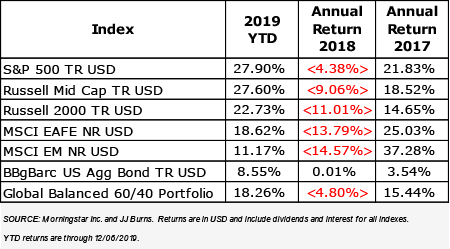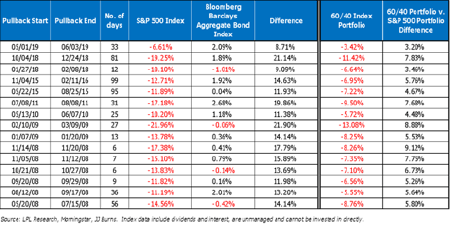As the year comes to a close, I can’t help but be reminded of A Christmas Carol. The Charles Dickens classic recounts the redemptive journey of a jaded, greedy Scrooge who learns from his mistakes and ends up discovering what really matters in life. Believe it or not, it’s a tale with profound lessons for our financial lives.
As our team looks back on the year behind us, Dickens’ “three spirits” certainly feel alive and well.

“If you cannot control your emotions, you cannot control your money.”
–Warren Buffett, legendary investor
Let’s first zoom out and reflect on 2019. It looks like we’re closing in on another strong year in the markets. The returns we currently see for bonds, stocks and commodities have all rebounded from a dour 2018. When we look a bit closer at the past three years, however, we can see why investors have had some emotional ups and downs with respect to their portfolios:

Thinking back to this time last year, investors were mired in a precipitous bear market that occurred over most of the fourth quarter. Policy concerns and recession fears were the lumps of coal in holiday stockings; the new year outlook was gloomy.
Lo and behold, a Fed policy reversal to pause rate hikes (later to begin lowering rates) and modest expectations for growth and earnings caused the markets to rebound. Bonds reversed their declines, and animal spirits seemed to return to the markets. As is usual each year end, we’re now focused on what’s going to happen next year.
We raise this issue because of the conversations we’ve recently been engaging in with our clients. Some have turned cautious and want to exit the stock market. Others want to put more money to work in stocks while yields are low and expected to stay that way. Now, regular readers of our newsletters and viewers of our occasional webcasts know that we’re big believers in the power of emotional control as a key component of portfolio returns.
With that in mind, let’s recap the financial lessons that Dickens’ “three spirits”—past, present and future—can teach us.
1. Learning from the Past
“The idea that a bell rings to signal when to get into or out of the stock market is simply not credible. After nearly fifty years in this business, I don’t know anybody who has done it successfully and consistently. I don’t even know anybody who knows anybody who has.”
–Jack Bogle, former chairman of Vanguard Group
We see some ‘recency bias’ taking hold in the markets. This means that analysis and expectations about the future are based on what’s happened most recently, and that state of affairs will continue (e.g. the market will continue to go up because it’s been going up). Simply put, we don’t subscribe to that theory for one reason: what has been happening can be quickly reversed with one news headline. Here’s proof:
Last year, we began tracking a few experts’ recommendations made on December 20, 2018. They predicted dire results for Apple common (AAPL), and recommendations to go to gold or cash. Here are the results almost one year later:

The recovery in the market and these other investments started on Christmas Day and has continued—with some pullbacks—since then.
So, the assumption that the market was going to continue to decline was right…for another three days.
2. Living in the Moment
“Far more money has been lost by investors trying to anticipate corrections, than lost in the corrections themselves.”
–Peter Lynch, legendary money manager at Fidelity Investments
We can’t control the past, but we can certainly take action in the present moment to help shore up our financial future. A globally diversified portfolio holds a variety of investments beyond U.S. large-cap stocks. Many of our clients have exposure to bonds of various credit quality ratings, with a core of high-quality U.S. bonds as an anchor in times of downward volatility in the stock markets. As this table shows, they provide ballast and a moderate amount of income, too.

We know two other portfolio facts: research demonstrates that investors feel the pain of a loss twice as intensely as the joy of a gain; successful market-timing for a single market correction, let alone a series of them, is impossible. A portfolio seeded with a bond allocation can help us keep a more even emotional keel through market fluctuations.
3. Leaning into the Future
“The best way to measure your investing success is not by whether you’re beating the market but by whether you’ve put in place a financial plan and a behavioral discipline that are likely to get you where you want to go.”
–Benjamin Graham, legendary value investor
A 55-year-old investor has, on average, approximately 27 years left to invest. About 15% of those 55-year-old investors will have 35 years or more in which to rely on their portfolios for growth and income. Simply put, even if inflation stays at current levels for some time, a bond-heavy portfolio will not be sufficient to meet long-term expenses and capital withdrawals.
Stocks are and will remain an integral portfolio component for inflation-beating growth; and yes, they come with periodically unpleasant volatility. Nobody likes market corrections, but they’re unavoidable. That’s why balance in planning and investing—including other investments beyond large-cap stocks—is important.
Imagine you’re hosting a cocktail party. You prepare delicious food and drinks and want to set the right ambience for guests to enjoy themselves by putting on some music. Is your choice guitar-heavy rock and roll at maximum sound levels (all stocks), or is it something more appropriate for a long evening at a moderate level (a balanced portfolio)? As the crowd dwindles, do you turn the music up LOUDER, or make it a bit softer for the remaining guests?
That’s the vision we bring to planning. We help with your long-term preparations and plan for a number of scenarios, and then make sure to adjust the music so it’s just right for the party.
At this reflective time of the year, take some time to think about why you plan and invest. If there is a change to your situation, then contact us and we’ll review and adjust your plan or portfolio as necessary. And if you’re going to a party, enjoy yourself.
Happy Holidays from your team at JJ Burns & Company!




